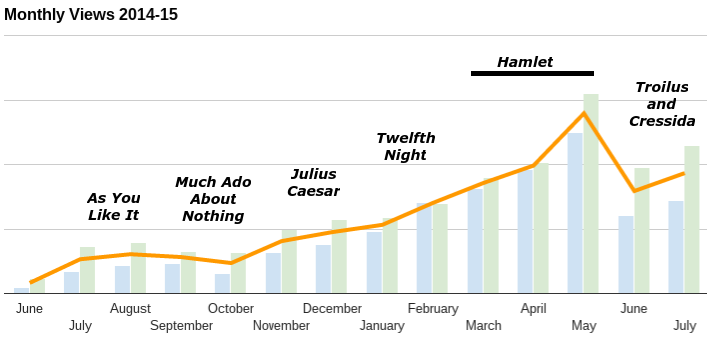I’ve updated the Bill / Shakespeare Project YouTube channel to include a playlist for All’s Well That Ends Well.
All’s Well That Ends Well: Act Three plot synopsis
When we left the All’s Well That Ends Well plot summary at the end of Act Two, Helena had married (by kingly force) to the man she loves, only to be abandoned by this Bertram, who vowed never to consummate the marriage and had left for the Tuscan wars. When Act Three, Scene One begins, we find ourselves in a new location: Florence, Italy, where its duke discusses the current war with some of his lords.
While Florence feels that his cause is “holy” (III.i.4), he wonders why the French king has not sent soldiers. On the other hand, “the younger of (Florence’s) nature” (III.i.17) are travelling there to help (think of “all the youth of England are on fire” in Henry V). I wonder who’s part of that band of soldiers? </sarcasm>
Continue reading “All’s Well That Ends Well: Act Three plot synopsis”
Damn you, Troilus and Cressida
Website traffic is a funny thing.

Or not.
Read famous plays throughout the school year, and numbers climb. Hit a not-so-famous “problem play” during summer vacay, and numbers drop.
Damn you, Cressida, and your cuckold Troilus and pimp uncle Pandarus.
[I don’t think Helena and Bertram and going to improve my numbers over the course of the next two months, either, alas…]
All’s Well That Ends Well: Act Two plot synopsis
When we left the All’s Well That Ends Well plot summary at the end of Act One, Helena had decided–with the Countess’ blessing–to venture to Paris to attempt to cure the King of France with medicines left to her by her late father. The second (and longest) act of the play begins in the court of France where some of the younger lords have decided to leave to fight in Italy against the army of Savoy. The King is more concerned with these young men becoming “captives” (II.i.21) to “those girls of Italy” (II.i.19), rather than with their deaths.
Continue reading “All’s Well That Ends Well: Act Two plot synopsis”
The Bill / Shakespeare Project presents: This Week in Shakespeare news, for the week ending Monday, August 3rd, 2015
Podcast: Play in new window | Download
[archive]
This week’s Shakespeare news review includes a whole mess of previews and reviews. PLUS our usual recap of this week’s daily highlights in Shakespearean history.
All’s Well That Ends Well: Act One plot synopsis
As we do with all plays, let’s begin our discussion with an overview of the narrative. As we begin our All’s Well That Ends Well plot summary, it is in time of mourning (“all (characters) in black” [opening stage direction]), and its opening line carries more death tidings: “In delivering my son from me, I bury a second husband” (I.i.1-2). The speaker is the otherwise nameless Countess of Rossillion. And we immediately hear from her son:
Continue reading “All’s Well That Ends Well: Act One plot synopsis”
Podcast 108: Troilus and Cressida: Cast, Concept, Wrap-up
Podcast: Play in new window | Download
[archive]
This week’s podcast concludes our two month-long discussion of Troilus and Cressida with a concept and cast, and a wrap-up of the play.
Continue reading “Podcast 108: Troilus and Cressida: Cast, Concept, Wrap-up”
A new play starts today!
Time to begin…
All’s Well That Ends Well

Let’s hope this is a more enjoyable experience (overall) than Troilus and Cressida (which wasn’t much fun until almost the end of our two month look).
Troilus and Cressida: The Wrap-up
When trying to write this wrap-up piece on Troilus and Cressida, I kept thinking it needed a subtitle. But what to use? I came up with two almost immediately:
How do you solve a problem like Cressida? (with apologies to Rodgers and Hammerstein)
or
Troilus and Cressida: How I learned to stop worrying and love (OK, like) the play
Do I focus on the misogyny that I found in the play (thus, the first subtitle)? Or do I go with the undercut heroic and romantic expectations in the play that lead to my revelation a few weeks ago that the play is a tragedy with Pandarus as our tragic hero?
It’s such a strange play.
The epicenter of Troilus and Cressida
Using Professor Rodes’ midpoint theory, let’s take a look at Troilus and Cressida.
